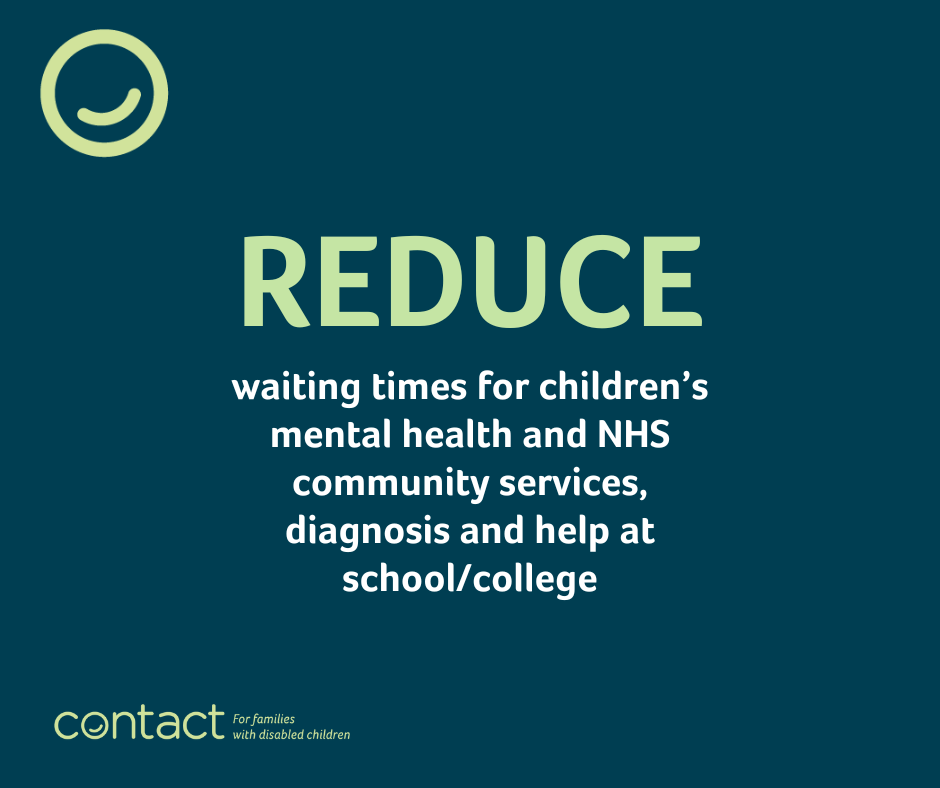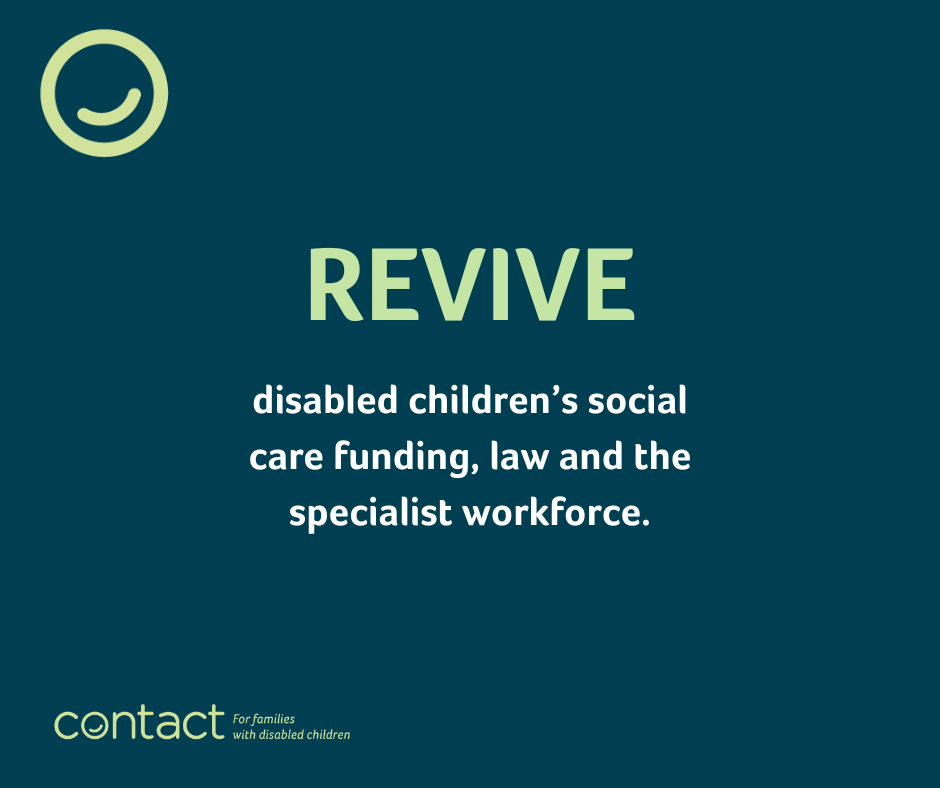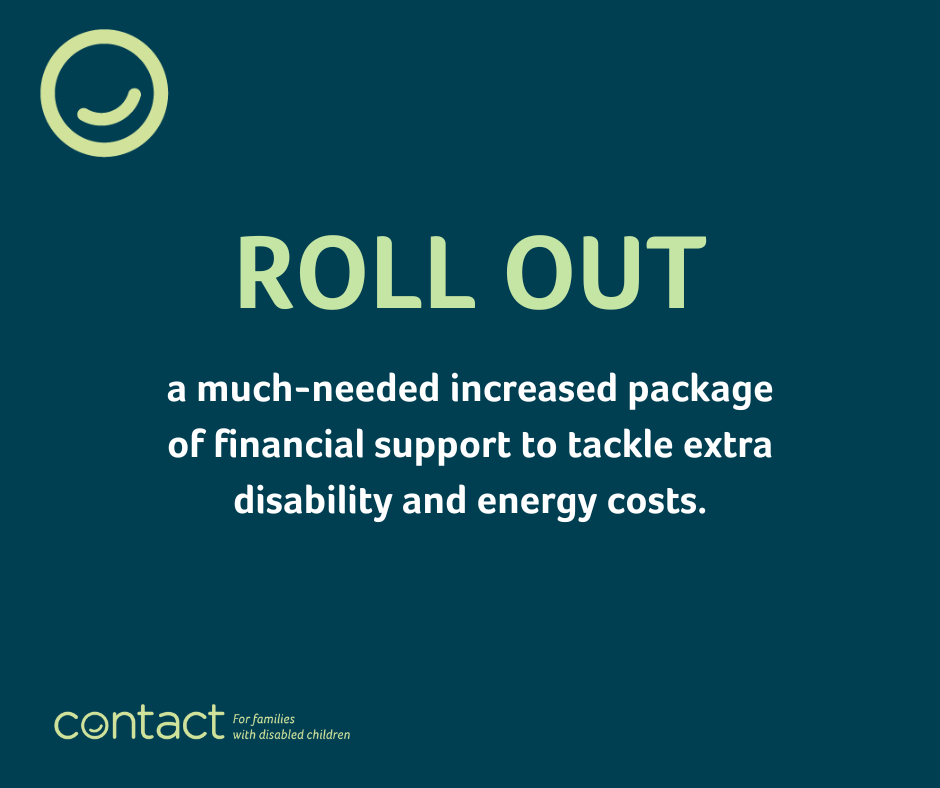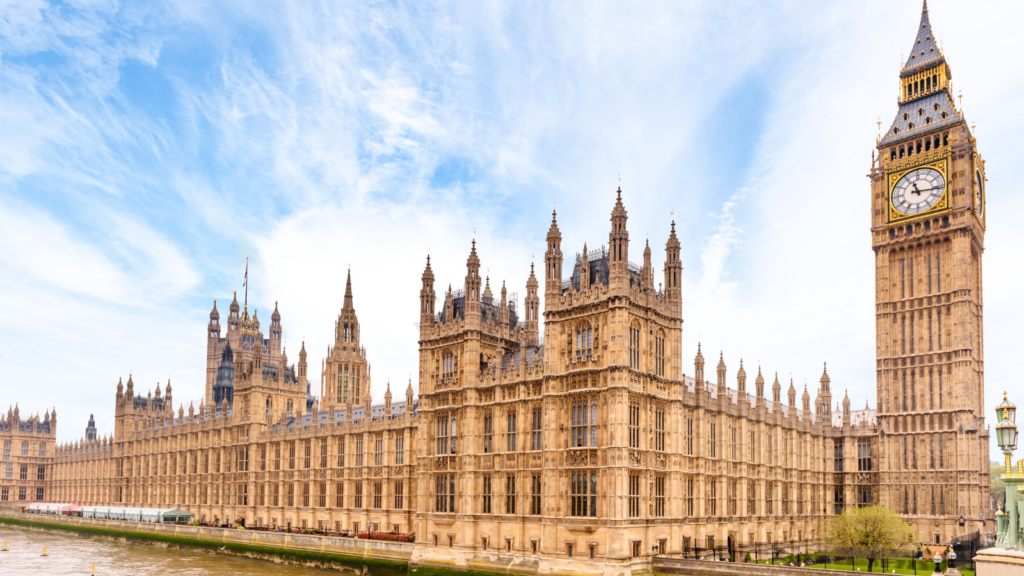There is a desperate lack of services, empathy and support for the 1.5 million disabled children and their families in the UK.
The new government, elected on Thursday 4 July, has a real opportunity to make a difference.
Our asks for the new government
We are calling on the new government to:
Reduce waiting times for children’s mental health and NHS community services, diagnosis and help at school and college.
Revive Disabled children’s social care funding and law as well as the specialist workforce.
Roll out a much-needed increased package of financial support to tackle extra disability, care and energy costs.



I really hope that the next government provides the much needed support that carers and disabled children need and start recognising the job that carers do. The 3 Asks that Contact are highlighting would make such a difference to people’s lives.
Taran, parent carer to Skye
10 steps to success
These are big asks.
But disabled children deserve a government prepared to think big and build a society where everyone has equal opportunities.
So, what would be a good start for the new government?
We’ve identified 10 SUCCESSFUL steps that would have an immediate impact:

Disabled people and their carers are currently being penalised from all angles.
On proposed changes to PIP, we fundamentally disagree that it is an “open question” whether people with learning disabilities should be receiving cash benefits and that a voucher system alongside the hopeful sounding “access to treatments” is an appropriate support. The government must withdraw this proposal immediately
Instead, the new government should reform Carer’s Allowance and review disability benefits more generally. These should cover the additional costs of disability and care, but currently fall short. This leaves disabled children and their families paying the extra expense.

80,000 disabled young people currently risk missing out on £210million of savings because the process of accessing their government-issued Child Trust Fund is too complicated.
This issue will also affect those with future savings, such as Junior ISAs.
We urge the government to work with the finance industry to resolve this issue by extending the DWP appointee scheme.

Our Out of Energy research found 40% of families have had to cut back on life saving medical equipment. 45% say they have not been able to keep their home warm enough for their child’s needs.
The new government must introduce an energy social tariff for households running essential medical and disability equipment.

The law says a young person must be in school or training until 18. But there is no right to school transport to get there once they turn 16.
This is grossly unfair. Disabled young people often travel further to school or college and are less likely to travel independently. Their parents are forced to give up work or face expensive transport costs just to get them to placements.
We are calling on the government to close the loophole in the law for 16-18 year olds. There must be a clear requirement for local authorities to provide eligible disabled young people the right support to get to their place of education.

Many disabled children and young people are not receiving the educational provision they need because current law is not complied with.
This brings no negative consequences for local decision-makers, only for children and young people.
Resolving this crisis lies in making sure that schools and local authorities comply with the law and fulfil their duties to disabled children and young people.
In England, the government must strengthen the Children and Families Act 2014 by putting SEN Support on a statutory footing and properly funding it. The law must also make health and social care jointly responsible for SEND provision alongside education.
The law is different in Wales, Scotland and Northern Ireland. But there is also a need for better funding and accountability in the system.
We are also calling for the new government to end the Safety Valve Agreements. These prioritise cost cutting over disabled children and young people’s rights to special educational provision.

Disabled children and their families are waiting too long to be seen.
The longest waiting lists are in community paediatrics, speech and language therapy and occupational therapy. There are unacceptable waits for autism assessments for children in most areas (some up to four years).
We want to see proper workforce planning so that children and young people now, and in the future, can access the support they need to thrive.
The government should ensure targeted, sustained and ring-fenced funding to eliminate waits and build sufficient capacity in community health and mental health services for disabled children.
This should be paired with a recruitment drive for properly trained and qualified clinical psychologists, paediatricians, and therapists.

There is a huge shortage of affordable and accessible housing for families with disabled children and young people.
Families are also waiting too long for housing adaptions needed to help manage their child’s condition and keep them safe.
A cross-party taskforce, with disabled people and carers as equal partners, could look into:
- Giving greater priority to families with disabled children who needing social housing.
- Reduce waiting times for specialist home adaptions and increase the grants available.
- How housing and social care departments can work better together.
- Higher accessibility standards when building new homes including how housing design work for autistic people.
- Availability of suitable housing for Disabled young people and young adults.

100,000 families with disabled children will be worse off by more than £2,290 per year. This is a result of the 50% cut to the lower child disability addition under Universal Credit. This can be fixed by increasing the lower child disability payments to better reflect their extra costs.
The government must stop the Universal Credit takeaway for children in hospital and for looked-after children in residential care.
And it should fix the rules that restrict many disabled young people “receiving education” from being able to claim Universal Credit.

Parent carers need to be recognised as the experts that they are. The government should:
- Fund better childcare so they can seek employment, and continue in their careers.
- Give them a meaningful voice in decision making at all levels.
- Recognise and reward care by increasing the level of Carer’s Allowance, so that it better reflects the level of financial penalty that carers face.

Families are telling us that the current short breaks (respite) system isn’t working. It’s too rigid to meet needs and too variable from one local area to the next.
Many families are finding it difficult to source suitable support workers/PAs. They are having funding being clawed back as a result. There must be more flexibility in how the funding can be used and transparency in how it is granted.
The next government should increase its investment in the short breaks innovation fund and prioritise health and social care support for disabled children in their spending plans.
We also want to see a commitment to taking forward the Law Commission review, and ensure that implementation of the social care reform recognises and prioritises the circumstances of disabled children and their families.
What you can do
Please help us make these asks a reality for families by sharing our Roadmap with your new MP.
